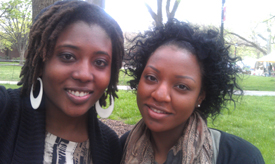Members of the Rutgers chapter of Journalists for Human Rights see their role above all else as putting issues on the university’s table, whether it’s alleged police brutality close to home or the murder of an innocent housewife in Iran; gang violence in the ghetto or the systematic persecution of gays and lesbians anywhere.
“It’s our job to get the information out there, to give people the freedom to make their own decision about how they want to get involved,” says Ta’Lissa Patrick of Palmyra, president of the organization and a Rutgers senior majoring in journalism and media studies in the School of Communications and Information.
Journalists for Human Rights, based in Toronto, is an international initiative of students and volunteers dedicated to working with local media to address a broad spectrum of issues. It sends trainers to help journalists on the ground in countries such as Sierra Leone, Liberia, Tanzania, and Democratic Republic of the Congo gather information and report on abuses that might otherwise be ignored.
Last summer, the organization sent 10 Canadian journalists to Malawi and Ghana to work in local schools and newsrooms to produce stories shining a light on human rights violations.
Quadeer Porter, now a senior in Rutgers’ School of Arts and Sciences majoring in African studies and public health, brought the group to Rutgers in 2009. Since then, it has sponsored poetry readings, film screenings, and community protests in an effort to gain visibility. Members took part in demonstrations in downtown New Brunswick last fall after the fatal shooting of city resident Barry Deloatch.
Engaging college students to venture outside their comfort zone is not always a walk in the park, acknowledges Tamiyah Yancey of Newark, recruitment chair for the organization who, like Patrick, is majoring in journalism and media studies.
“Even when people do hear about human rights violations, they think the issue doesn’t pertain to them,” Yancey says. “A lot of people here are very comfortable – our challenge is to get them to care about the issues we’re writing about.”
Her organization is partnering with a multitude of groups, including the Muslim Students Association, the Rutgers branch of the National Association for the Advancement of Colored People and the School of Arts and Sciences’ Educational Opportunity Fund (EOF) to encourage campus-based activism. Many members of the human rights group’s executive board are affiliated with EOF.
“It’s really noble for students so young to have such a passion,” says Hema Patel, assistant director of EOF on the Douglass Residential Campus and advisor to the group since its inception. “They’re trying to integrate technology and social media – in effect taking their academic interests and trying to give them a real-world application.”
For Yancey, that means writing a column for the Daily Targum titled “Pigment of My Imagination” and raising her voice against female genital mutilation in Africa, Australia and America. Patrick is putting her journalistic energy into combating sex trafficking, which she says occurs globally, not just in third-world countries.
Both students – longtime friends as well as collaborators – say attracting attention to the problems is just the first step toward making a difference.
“News today spreads much faster, with Twitter, Facebook and YouTube, but people also forget about it faster,” Yancey says, citing the recent media fury over Joseph Kony, head of the Ugandan guerilla group Lord’s Resistance Army. “You get all riled up over and issue, but then you click on another link and you’re gone.”



